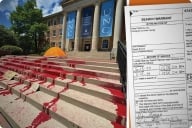You have /5 articles left.
Sign up for a free account or log in.
The way things currently stand, a motion filed in federal district court in Oregon last week could force a legal reevaluation of the recording industry's strategy of rooting out students who illegally share copyrighted material using peer-to-peer networks. Or, it might not.
The outcome hinges on which of the Oregon attorney general's arguments, if any, will persuade the court that subpoenas served on behalf of 12 recording companies circumvent established legal procedure. On September 17, the companies issued subpoenas to 17 "Does" -- who were identified only by their IP addresses -- via the University of Oregon, where they are all students. Such subpoenas are commonly sent to universities, which can match the addresses to the Internet accounts assigned to individual students.
Instead of complying with the subpoenas, as many colleges do, the university decided to challenge them, arguing that they were too broadly written, violate students' privacy and ignore the Digital Millennium Copyright Act, which in 1998 set out specific procedures that content providers could use to challenge online piracy. Acting for the university, the state's attorney general filed a motion on October 31 to quash the subpoenas, setting out on uncharted territory that has legal and industry observers watching closely.
"I’m unaware of other colleges and universities that are making the same arguments that Oregon is making," said Steven L. Worona, director of policy and networking programs for Educause, a nonprofit organization that supports technology use in higher education.
The motion represents one of the few challenges to the recording industry's current practice of sending "pre-litigation" letters to students, offering a choice between a discounted settlement or going to court. Since students' identities aren't known to the companies themselves, colleges are placed in the reluctant role of de facto enforcers: Some pass the letters on to their students, but some don't. Theoretically, the process would reach the subpoena stage only if a student chose to refuse a settlement deal or if the college decided not to pass the letter on in the first place.
The recording industry has vigorously defended its methods of protecting its copyrights. Jonathan Lamy, the RIAA’s director of communications, said at an Ohio University forum last week that his clients’ role was to “help [artists] bring music to the public, to help the marketplace grow.”
In Oregon's case, it appears that the university initially agreed to cooperate with the companies after receiving pre-litigation letters requesting specific information about alleged violations from users of the campus network. The university's response, essentially, was that "what we can track down ... is the location, IP address, and we will track that down and preserve it for you as a first step in the process of resolving it," said Stephanie Soden, a spokeswoman for the Oregon Department of Justice.
Instead, the motion alleges, the companies filed the subpoenas anyway, citing danger that the sought-after records would be destroyed -- even though, according to the attorney general, the university was already cooperating to ensure that that wouldn't happen. Partially on those disputed grounds, the companies obtained an "ex parte" court order, granting them permission to file the subpoenas through Rule 45 of the Federal Rules of Civil Procedure, which governs the process by which plaintiffs can engage in discovery.
But critics of this process point out that the "ex parte" orders necessarily operate on limited information provided by the companies so that, as a result, they are granted routinely. The university goes further, arguing that invoking Rule 45 circumvents the intended method of combating copyright infringement online set out by the DMCA. The digital copyright law was intended to allow copyright holders to subpoena content providers -- today, this category would include YouTube, for example -- without going through a court first. Oregon insists that the same procedure should hold for Internet service providers, as well -- such as the university -- and argues that the record industry should work within DMCA provisions rather than Rule 45.
The question, then, boils down to whether the DMCA overrides Rule 45, or supplements it. "To my knowledge, that argument has not been addressed by any court up until now," said Fred von Lohmann, a senior staff attorney at the Electronic Frontier Foundation, which criticizes the recording industry's enforcement tactics.
The motion outlined several other arguments:
- It would be impossible to match IP addresses with individual students for several reasons. The motion argues, for example, that it cannot be determined whether the student in question was using his or her account when the unauthorized activity took place. Furthermore, some computers are in common areas or in dorm rooms with more than one resident.
- The subpoenas themselves were overly broad.
- To comply with the subpoenas, the university would have to violate students' privacy by conducting an investigation that could fall afoul of the Family Educational Rights and Privacy Act .
The next step is unclear, and it may be premature to sound the death knell for pre-litigation letters or any other strict enforcement measures aimed at students who share copyrighted works. One reason is that so many other colleges have complied so far with the industry. Oregon's motion "is pretty unusual. I think the vast majority of universities have caved to the recording industry’s subpoena demands. There are some others who have put up a bit more of a fight," von Lohmann said.
One such case, cited in the Oregon motion, involved the College of William and Mary, when a federal court ruled that the industry's subpoenas were valid only through DMCA channels.
"I’m carefully watching how both the individual targets of the suits and their institutions and their ISPs are reacting to all of this, and I think it’s certainly too early to say it’s a turning point, but I guess people are investigating all of their options," Worona said.








